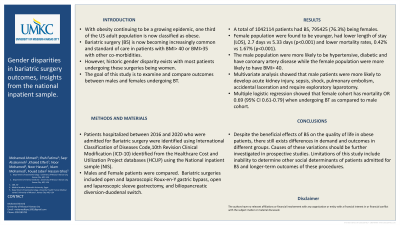Monday Poster Session
Category: Stomach
P2749 - Gender Disparities in Bariatric Surgery Outcomes, Insights From the National Inpatient Sample
Monday, October 23, 2023
10:30 AM - 4:15 PM PT
Location: Exhibit Hall

Has Audio
- MA
Mohamed Ahmed, MD
University of Missouri Kansas City
Overland park, KS
Presenting Author(s)
Mohamed Ahmed, MD1, Ifrah Fatima, MD2, Saqr Alsakarneh, MD2, Khaled Elfert, MD3, Noor Mohamed, MD4, Noor Hassan, MD2, Islam Mohamed, MD2, Fouad Jaber, MD2, Hassan Ghoz, MD2
1University of Missouri Kansas City, Overland Park, KS; 2University of Missouri-Kansas City, Kansas City, MO; 3SBH Health System, Bronx, NY; 4Alexandria University, Alexandria, Al Iskandariyah, Egypt
Introduction: With obesity continuing to be a growing epidemic, one third of the US adult population is now classified as obese. Bariatric surgery (BS) is now becoming increasingly common and standard of care in patients with BMI > 40 or BMI >35 with other co-morbidities. However, historic gender disparity exists with most patients undergoing these surgeries being women. The goal of this study is to examine and compare outcomes between males and females undergoing BS.
Methods: Patients hospitalized between 2016 and 2020 who were admitted for Bariatric surgery were identified using International Classification of Diseases Code,10th Revision Clinical Modification (ICD-10) identified from the Healthcare Cost and Utilization Project databases (HCUP) using the National inpatient sample (NIS). Males and Female patients were compared. Bariatric surgeries included open and laparoscopic Roux-en-Y gastric bypass, open and laparoscopic sleeve gastrectomy, and biliopancreatic diversion-duodenal switch.
Results: A total of 1042114 patients had BS, 795425 (76.3%) being females. Table 1 summarizes general characteristics of both groups with female population being younger, has lower length of stay (LOS), 2.7 days vs 5.33 days (p< 0.001) and lower mortality rates, 0.42% vs 1.67% (p< 0.001). The male population were more likely to be hypertensive, diabetic and have coronary artery disease while the female population were more likely to have BMI > 40. Multivariate analysis showed that male patients were more likely to develop acute kidney injury, sepsis, shock, pulmonary embolism, accidental laceration and require exploratory laparotomy. Outcomes are summarized in table 2. Multiple logistic regression showed that female cohort has mortality OR 0.69 (95% CI 0.61-0.79) when undergoing BT as compared to male cohort.
Discussion: Despite the beneficial effects of BS on the quality of life in obese patients, there still exists differences in demand and outcomes in different groups. Causes of these variations should be further investigated in prospective studies. Limitations of this study include inability to determine other social determinants of patients admitted for BS and longer-term outcomes of these procedures.
Disclosures:
Mohamed Ahmed, MD1, Ifrah Fatima, MD2, Saqr Alsakarneh, MD2, Khaled Elfert, MD3, Noor Mohamed, MD4, Noor Hassan, MD2, Islam Mohamed, MD2, Fouad Jaber, MD2, Hassan Ghoz, MD2. P2749 - Gender Disparities in Bariatric Surgery Outcomes, Insights From the National Inpatient Sample, ACG 2023 Annual Scientific Meeting Abstracts. Vancouver, BC, Canada: American College of Gastroenterology.
1University of Missouri Kansas City, Overland Park, KS; 2University of Missouri-Kansas City, Kansas City, MO; 3SBH Health System, Bronx, NY; 4Alexandria University, Alexandria, Al Iskandariyah, Egypt
Introduction: With obesity continuing to be a growing epidemic, one third of the US adult population is now classified as obese. Bariatric surgery (BS) is now becoming increasingly common and standard of care in patients with BMI > 40 or BMI >35 with other co-morbidities. However, historic gender disparity exists with most patients undergoing these surgeries being women. The goal of this study is to examine and compare outcomes between males and females undergoing BS.
Methods: Patients hospitalized between 2016 and 2020 who were admitted for Bariatric surgery were identified using International Classification of Diseases Code,10th Revision Clinical Modification (ICD-10) identified from the Healthcare Cost and Utilization Project databases (HCUP) using the National inpatient sample (NIS). Males and Female patients were compared. Bariatric surgeries included open and laparoscopic Roux-en-Y gastric bypass, open and laparoscopic sleeve gastrectomy, and biliopancreatic diversion-duodenal switch.
Results: A total of 1042114 patients had BS, 795425 (76.3%) being females. Table 1 summarizes general characteristics of both groups with female population being younger, has lower length of stay (LOS), 2.7 days vs 5.33 days (p< 0.001) and lower mortality rates, 0.42% vs 1.67% (p< 0.001). The male population were more likely to be hypertensive, diabetic and have coronary artery disease while the female population were more likely to have BMI > 40. Multivariate analysis showed that male patients were more likely to develop acute kidney injury, sepsis, shock, pulmonary embolism, accidental laceration and require exploratory laparotomy. Outcomes are summarized in table 2. Multiple logistic regression showed that female cohort has mortality OR 0.69 (95% CI 0.61-0.79) when undergoing BT as compared to male cohort.
Discussion: Despite the beneficial effects of BS on the quality of life in obese patients, there still exists differences in demand and outcomes in different groups. Causes of these variations should be further investigated in prospective studies. Limitations of this study include inability to determine other social determinants of patients admitted for BS and longer-term outcomes of these procedures.
Disclosures:
Mohamed Ahmed indicated no relevant financial relationships.
Ifrah Fatima indicated no relevant financial relationships.
Saqr Alsakarneh indicated no relevant financial relationships.
Khaled Elfert indicated no relevant financial relationships.
Noor Mohamed indicated no relevant financial relationships.
Noor Hassan indicated no relevant financial relationships.
Islam Mohamed indicated no relevant financial relationships.
Fouad Jaber indicated no relevant financial relationships.
Hassan Ghoz indicated no relevant financial relationships.
Mohamed Ahmed, MD1, Ifrah Fatima, MD2, Saqr Alsakarneh, MD2, Khaled Elfert, MD3, Noor Mohamed, MD4, Noor Hassan, MD2, Islam Mohamed, MD2, Fouad Jaber, MD2, Hassan Ghoz, MD2. P2749 - Gender Disparities in Bariatric Surgery Outcomes, Insights From the National Inpatient Sample, ACG 2023 Annual Scientific Meeting Abstracts. Vancouver, BC, Canada: American College of Gastroenterology.
